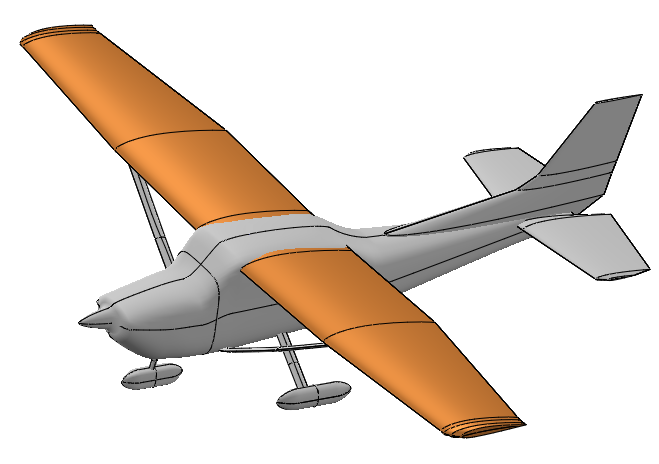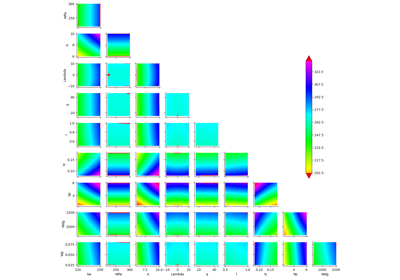The Wing weight function¶
The Wing weight function of Forrester et al. (2008) is a recurrent test case for modeling purpose and sensitivity analysis in aerospace context. This function is extracted and adapted from the Raymer handbook for aircraft design. It is representative of a Cessna C172 Skyhawk wing aircraft. It depends on the wing area, the weight of fuel in the wing, the aspect ratio, the quarter-chord sweep angle, the dynamic pressure at cruise, the taper ratio, the airfoil thickness to chord ratio, the ultimate load factor, the flight design gross weight and the paint weight.

The function is defined as follows:
with:
, the wing area (ft^2)
, the weight of fuel in the wing (lb)
, the aspect ratio (-)
, the quarter-chord sweep angle (deg)
, the dynamic pressure at cruise (lb/ft^2)
, the taper ratio (-)
, the airfoil thickness to chord ratio (-)
, the ultimate load factor (-)
, the flight design gross weight (lb)
, the paint weight (lb/ft^2)
We assume that the input variables are independent.
References¶
Forrester, A., Sobester, A., & Keane, A. (2008). Engineering design via surrogate modelling: a practical guide. Wiley.
Moon, H., Dean, A. M., & Santner, T. J. (2012). Two-stage sensitivity-based group screening in computer experiments. Technometrics, 54(4), 376-387.
Raymer D.P. (2018). Aircraft Design: a conceptual approach. American Institute of Aeronautics and Astronautics.
API documentation¶
- class WingWeightModel
Data class for the Wing weight model.
- Attributes:
- dimint
Dimension of the problem, dim = 10
- Sw
Uniform Wing area (ft^2) distribution First marginal, ot.Uniform(150, 200)
- Wfw
Uniform Weight of fuel in the wing (lb) distribution Second marginal, ot.Uniform(220, 300)
- A
Uniform Aspect ratio (-) distribution Third marginal, ot.Uniform(6, 10)
- Lambda
Uniform Quarter chord sweep (deg), distribution Fourth marginal, ot.Uniform(-10, 10)
- q
Uniform Dynamic pressure at cruise (lb/ft^2) distribution Fifth marginal, ot.Uniform(16, 45 )
- l
Uniform Taper ratio (-) distribution Sixth marginal, ot.Uniform(0.5, 1)
- tc
Uniform Airfoil thickness to chord ratio (-) distribution Seventh marginal, ot.Uniform(0.08, 0.18)
- Nz
Uniform Ultimate load factor (-) distribution Eighth marginal, ot.Uniform(2.5, 6)
- Wdg
Uniform Flight design gross weight (lb) distribution Nineth marginal, ot.Uniform(1700, 2500)
- Wp
Uniform Paint weight (lb/ft^2) distribution Tenth marginal, ot.Uniform(0.025, 0.08)
- inputDistribution
JointDistribution The joint distribution of the input parameters.
- model
PythonFunction The Wing weight model with Sw, Wfw, A, Lambda, q, l, tc, Nz, Wdg and Wp as variables.
Examples
>>> from openturns.usecases import wingweight_function >>> # Load the Wing weight model >>> ww = wingweight_function.WingWeightModel()
Examples based on this use case¶

Example of sensitivity analyses on the wing weight model
 OpenTURNS
OpenTURNS